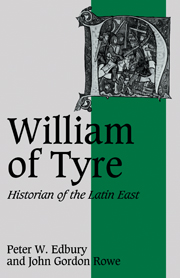Book contents
- Frontmatter
- Contents
- Preface
- Abbreviations and forms of reference
- Introduction
- PART I WILLIAM OF TYRE AND THE WRITING OF THE ‘HISTORIA’
- 1 William's career
- 2 William's historical writings
- 3 Classical and Christian influences in the Historia
- 4 William and his sources
- PART II WILLIAM OF TYRE AND THE MEANING OF THE ‘HISTORIA’
- Conclusion
- Bibliography
- Index
- Cambridge studies in medieval life and thought
3 - Classical and Christian influences in the Historia
Published online by Cambridge University Press: 09 October 2009
- Frontmatter
- Contents
- Preface
- Abbreviations and forms of reference
- Introduction
- PART I WILLIAM OF TYRE AND THE WRITING OF THE ‘HISTORIA’
- 1 William's career
- 2 William's historical writings
- 3 Classical and Christian influences in the Historia
- 4 William and his sources
- PART II WILLIAM OF TYRE AND THE MEANING OF THE ‘HISTORIA’
- Conclusion
- Bibliography
- Index
- Cambridge studies in medieval life and thought
Summary
Even if the autobiographical chapter in which William described his studies in western Europe had remained lost to view, there would be no questioning the nature of his educational background. The Historia itself provides ample testimony to the breadth of his learning and to the influences which bore upon him. In the light of his long sojourn in the Schools of the West it comes as no surprise to find evidence throughout his work of his indebtedness to the authors of pagan antiquity and the earlier Christian centuries, whether in his choice of words and his use of quotations, in the information he wished to impart, or indeed in the form and genre of his historical writing itself.
In a masterly fashion his modern editor has provided us with a scholarly apparatus, identifying the sources of his quotations and classical allusions and also drawing attention to a large number of instances in which his phraseology is reminiscent of those ancient or Christian writers whose works were widely read and admired in the twelfth century. Frequently, as we might expect from an educated churchman, William quoted the Vulgate version of the Bible or used expressions which call to mind phrases from it, and he also echoed the wording of the liturgy. The list of pagan authors Professor Huygens has noted as providing the origins for other verbal echoes is long – Plautus, Terence, Cicero, Sallust, Virgil, Horace, Livy, Ovid, Quintilian, Statius, Persius, Lucan, Juvenal and Suetonius – as is the list of Christian writers – Jerome, Augustine, Orosius, Prudentius, Sulpicius Severus, Boethius, Benedict of Nursia, Cassiodorus, Gregory the Great and Einhard.
- Type
- Chapter
- Information
- William of TyreHistorian of the Latin East, pp. 32 - 43Publisher: Cambridge University PressPrint publication year: 1988

